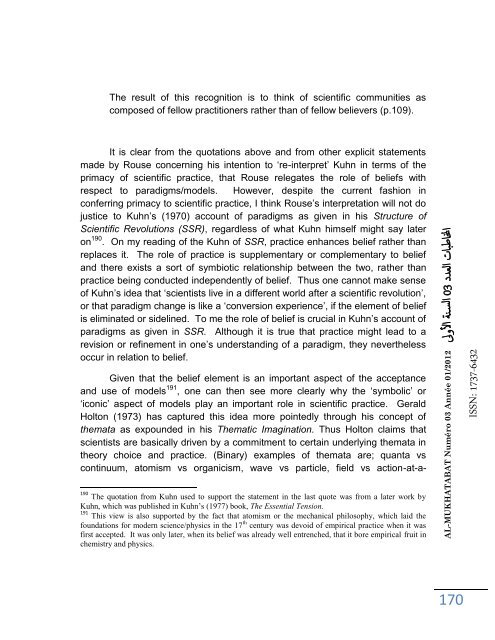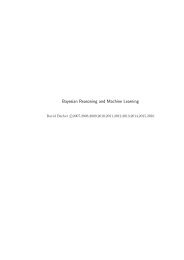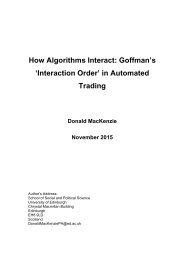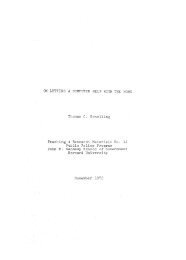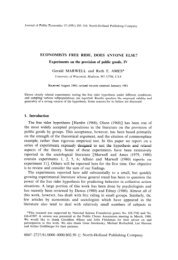n3-al-mukhatabat-journal
n3-al-mukhatabat-journal
n3-al-mukhatabat-journal
You also want an ePaper? Increase the reach of your titles
YUMPU automatically turns print PDFs into web optimized ePapers that Google loves.
The result of this recognition is to think of scientific communities as<br />
composed of fellow practitioners rather than of fellow believers (p.109).<br />
It is clear from the quotations above and from other explicit statements<br />
made by Rouse concerning his intention to ‘re-interpret’ Kuhn in terms of the<br />
primacy of scientific practice, that Rouse relegates the role of beliefs with<br />
respect to paradigms/models. However, despite the current fashion in<br />
conferring primacy to scientific practice, I think Rouse’s interpretation will not do<br />
justice to Kuhn’s (1970) account of paradigms as given in his Structure of<br />
Scientific Revolutions (SSR), regardless of what Kuhn himself might say later<br />
on 190 . On my reading of the Kuhn of SSR, practice enhances belief rather than<br />
replaces it. The role of practice is supplementary or complementary to belief<br />
and there exists a sort of symbiotic relationship between the two, rather than<br />
practice being conducted independently of belief. Thus one cannot make sense<br />
of Kuhn’s idea that ‘scientists live in a different world after a scientific revolution’,<br />
or that paradigm change is like a ‘conversion experience’, if the element of belief<br />
is eliminated or sidelined. To me the role of belief is cruci<strong>al</strong> in Kuhn’s account of<br />
paradigms as given in SSR. Although it is true that practice might lead to a<br />
revision or refinement in one’s understanding of a paradigm, they nevertheless<br />
occur in relation to belief.<br />
Given that the belief element is an important aspect of the acceptance<br />
and use of models 191 , one can then see more clearly why the ‘symbolic’ or<br />
‘iconic’ aspect of models play an important role in scientific practice. Ger<strong>al</strong>d<br />
Holton (1973) has captured this idea more pointedly through his concept of<br />
themata as expounded in his Thematic Imagination. Thus Holton claims that<br />
scientists are basic<strong>al</strong>ly driven by a commitment to certain underlying themata in<br />
theory choice and practice. (Binary) examples of themata are; quanta vs<br />
continuum, atomism vs organicism, wave vs particle, field vs action-at-a-<br />
190 The quotation from Kuhn used to support the statement in the last quote was from a later work by<br />
Kuhn, which was published in Kuhn’s (1977) book, The Essenti<strong>al</strong> Tension.<br />
191 This view is <strong>al</strong>so supported by the fact that atomism or the mechanic<strong>al</strong> philosophy, which laid the<br />
foundations for modern science/physics in the 17 th century was devoid of empiric<strong>al</strong> practice when it was<br />
first accepted. It was only later, when its belief was <strong>al</strong>ready well entrenched, that it bore empiric<strong>al</strong> fruit in<br />
chemistry and physics.<br />
AL-MUKHATABAT Numéro 03 Année 01/2012 لىولأا ةن سلا 30 ددعلا تابطانا<br />
170<br />
ISSN: 1737-6432


